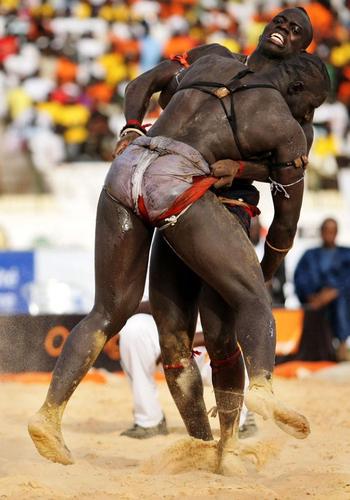
MY STORY.
In 1987 when i went to my village Izge for the first time from the city of Maiduguri, i, like every other city boy wanted to show my village friends how strong, brave and gallant i was one evening during a game of Kokuwa. That was a grave mistake on my part, it was foolish of me to underestimate the villagers in the game of Kokuwa.....
KOKUWA.
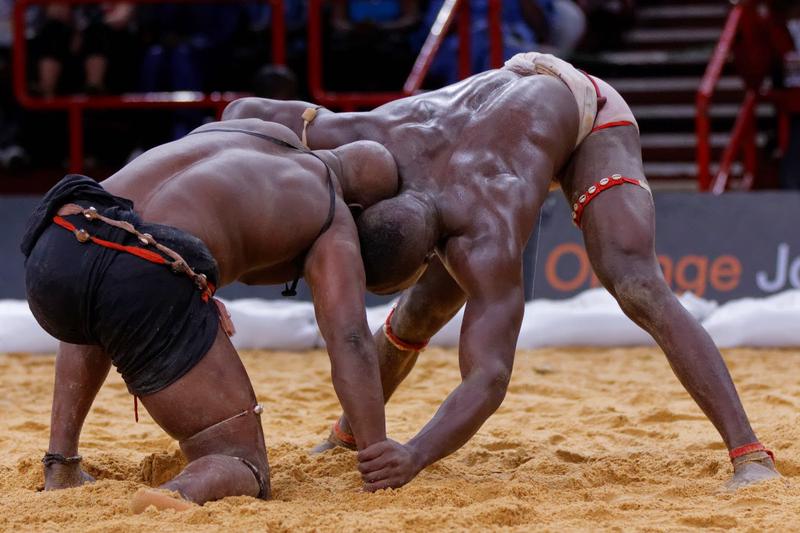
Kokuwa is a traditional wrestling and one of the most respected and prestigious traditional sports of Hausa people in northern Nigeria, as well as some few States across the southern and Western parts of the country. It is a form of Local wrestling that dates back centuries ago. Historically, Kokuwa is the sport that gave birth to Dambe (kickboxing), a traditional striking and kicking sport centuries ago. The sport used to be confined to the villages, done as a form daily routine and largely during annual festivals, but it has now graduated to the cities of Northern Nigeria where the states organize major Tournaments which warriors of Kokuwa from different states come and partake in.
Niger Republic and Senegal are two other West African countries that prominently play the Hausa peoples version of Kokuwa. However, there is no country in Africa that helds Kokuwa in high esteem like Niger Republic. Although there are variations in the rules and regulations, ring type and time limit in the countries mentioned, but essentially the sport is the same.
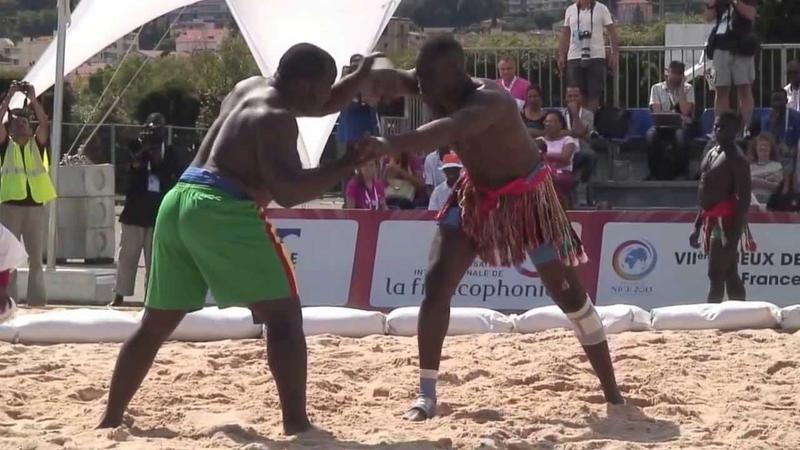
Kokuwa contests are staged during the day and on sand. Sometimes it is played as a moonlight sport. In Niger Republic for example, players can quickly get out of the ring when defeat is eminent, while the Nigerian type of ring has no demarcation for a fighter to step out from in other to avoid defeat. But on the whole, Kokuwa matches were and still of varying Social significance and of similar application in most places as mentioned above.
Kokuwa is a sport that demonstrates masculinity, personal prestige and honour to one's family and the entire village. Among the most interesting traditional aspect of the sport is the settings conducted to winning the hand of a lady in marriage. Contest are set to test the males against each other if two or more of them are seeking the hand of one lady in marriage, the winner of course will take his human trophy home eventually. Another traditional and cultural value of Kokuwa is that periodic contest are staged in the villages to test the gallantry of fighters and to also prepare them for inter-tribal wars between clans, villages as well as boundary clashes that may arise.
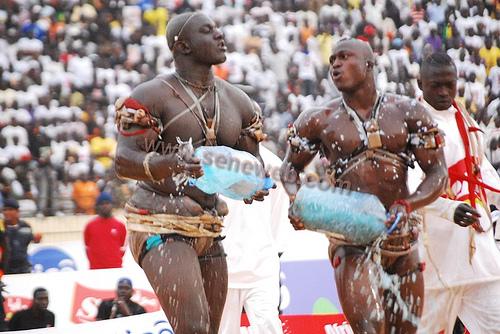
Just as its counterpart Dambe, Kokuwa is a sport that it's athletes cannot do without the usage of Charms, Amulets, patronages of marabouts, Soothsayers and any other mysterious or metaphysical powers in the name of victory. Warriors are seen with all kinds of Charms and Amulets tied around their necks, waists, wrists, tighs, upper arms, ankles and every other place that it could be attached to. Strange incantations are a common sight performed by the athletes before any encounter at tournaments.
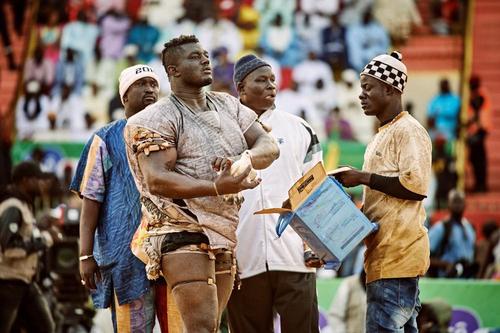
It will be proper to mention at this stage that some of the more refined and modern form of Kokuwa have banned the tying of any strange object on contestants. Referees are mandated to walk out any athlete who refused to adhere to such rule.
However, unlike it's counterpart Dambe, Kokuwa is generally accepted by all the communities including the Traditional and Government Authorities due to the non violent nature of the sport. There are hardly any injuries sustained during or after matches aside minor bruises that will be gotten as a result of holding. But that is not to say that the sport is 100% free of injuries, athletes with sinister intentions cannot be ruled out completely in any physical sport of this nature.
HOW IT IS PLAYED
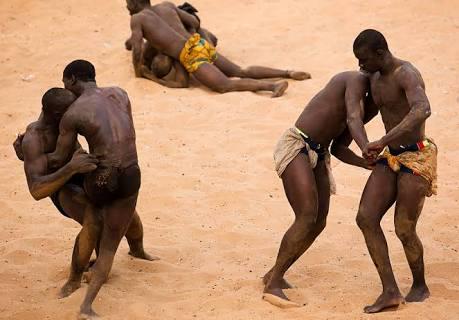
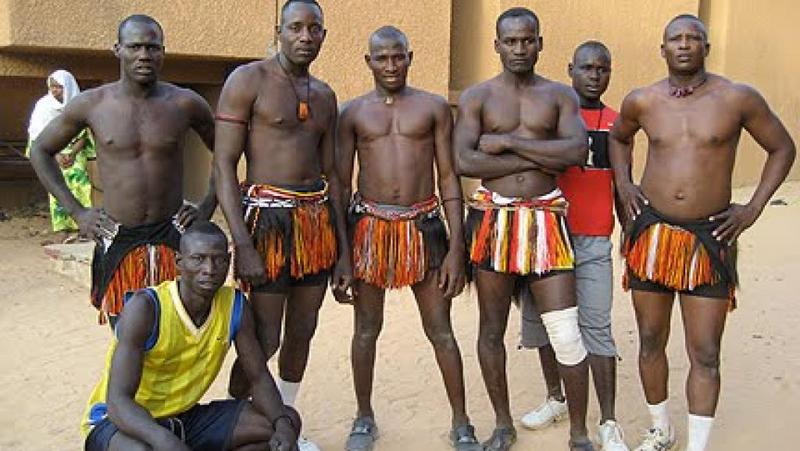
* The sport is played in a sand filled small circle measuring about 30 mètres in radius, demarcated by harmless objects. Other tournaments have the crowd of fans and spectators as the demarcation.
* Only the two fighters and the referee are allowed into the ring during a match.
* Fighters are matched based on weight classifications as well as popularity and fame.
* A fighter is expected to employ all tactics and skill at his disposal to defeat his opponent using traditional methods accepted by all.
* Hitting or kicking is not allowed. A fighter can hold an opponents hands, legs, head, waist, and knees.
* Method of dressing is bare chested, bare footed and the wearing of shorts. Shorts can be simply a wrapper tied around the waist through the groin area, animal skins tied around the waist or pieces of clothing material known as Bante tied around the waist like a skirt.
* Modern day tournaments have three rounds of three minutes each for a winner to emerge. But in most traditional settings, the time is determined by when a winner emages. However, a match is declared a tie after a reasonable period has elapsed with no winner as well as inactivity by the duo.
* A winner is declared when an opponents back is against the sand or when the hands and knees of a fighter is forced down by an opponent.
* The trophies given to winners varies from one country to another. In Niger Republic for example a Sword along side cash is given to a winner, while in Nigeria a Cup trophy is given.
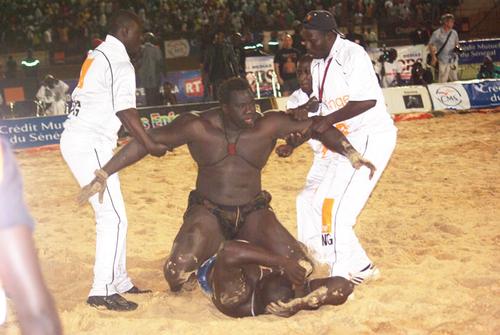
BACK TO MY STORY.
... I will never forget that evening because every fighter i contested against in my village knows how to make sure that my back was on the fine sand with him sitting on or standing over me. My being bigger in size and appearance was of no use. Right up to this day i honestly cannot tell the tricks with which they used in defeating me. I will never forget the shame i faced and the blow my city boy ego received that evening. i was made to understand that size does not really matter in Kokuwa. skill, experience and wit is an ingredient that a fighter cannot do without. Brute strength and bigger size may take a fighter to a point in the sport, but it is not sufficient enough to take a fighter far in Kokuwa.
All pictures used for this post are sourced here.
I HOPE YOU ENJOYED THE STORY OF KOKUWA.
Thank you for stopping by. @izge
Comments